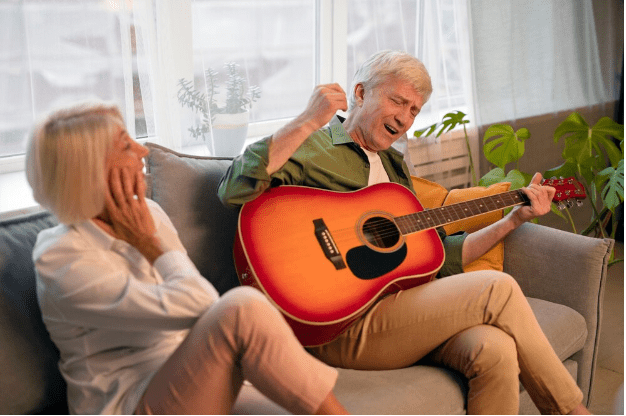Surprising Benefits of Music Therapy for Seniors

Songs can bring back happy memories and make us smile right away. Though there are many ways to add healing music to our elder one’s lives, music therapy is a source of comfort and joy and provides a feeling of connection.
Music therapy is not just about listening to music; it also includes active engagement with rhythm, melody, playing instruments, singing and activities that involve movement. The therapy is so enjoyable that it is seen as entertainment or social activity in many senior living communities. From dealing with symptoms of dementia and depression to improving physical, mental, and social-emotional functioning, music therapy offers numerous surprising benefits that can improve the quality of life for seniors. Let’s understand the types and benefits of music therapy for seniors in detail!
Types of Music Therapy
There are two main streams of music therapy for elder companion care, including active and receptive music therapy. Let’s take a closer look at the both of these:
Active Music Therapy
With this therapy, experts engage seniors in creating music through singing, playing instruments, composing, or improvising. It promotes cognitive stimulation by enhancing memory and attention.
- Dancing: Dancing is a kind of therapeutic activity where therapists use music to encourage movement and emotional expression. Sessions can be one-on-one or in groups, involving either body movement or including props like flags.
- Singing or Playing Instruments: Another common form of music therapy is singing or learning to play instruments. In this, participants discover new skills or rediscover old ones with music, using it to explore their thoughts and emotions.
- Songwriting or Improvisation: This activity promotes their creativity skills and includes collaborative efforts as they have to compose new pieces and spontaneous musical moments.
Receptive Music Therapy
Receptive music therapy includes listening to selected music (live or recorded) chosen by a music therapist with particular therapeutic goals in mind. After the music session, seniors discuss their feelings and talk about different parts of the music and what they liked about it. This activity helps in relaxing, managing stress and easing anxiety.
Surprising Benefits of Music Therapy for Seniors
Physical Health Benefits of Music Therapy
Physical Movement and Exercise:
While listening to music seniors can perform different activities like dancing, tapping their feet, or clapping hands. It not only promotes physical exercise and coordination but also helps in maintaining joint flexibility, muscle strength, and overall mobility.
Pain Management:
Music therapy for the elderly helps stimulate the release of endorphins, which are the body's natural pain relievers. This can help to distract them from pain sensations, shift focus away from acute and chronic pain in seniors, and help to relax them without taking pain medications.
Cardiovascular Health:
Faster-tempo music can benefit seniors' cardiovascular health by improving their cardiovascular system. How? Faster music beats increase heart rate and enhance blood circulation throughout the body. Improvement in blood flow is important to supply oxygen and nutrients to tissues and organs, which promotes overall cardiovascular health. Regularly performing upbeat music exercises can also help maintain healthy blood pressure levels and reduce the risk of heart-related issues such as hypertension and heart disease.
Respiratory Function:
Certain types of music, like slow, calming melodies, can help control breathing patterns. This exercise is beneficial for seniors dealing with respiratory conditions such as COPD (Chronic Obstructive Pulmonary Disease) which helps them to achieve deeper, more controlled breathing. Combining rhythmic breathing with the music's tempo can improve oxygen intake and carbon dioxide release.
Mental Health Benefits of Music Therapy
Emotional Well-being:
Music therapy helps seniors connect to their past and switch their mood. Music directly impacts the brain's limbic system, which regulates emotions and memory. Familiar songs stimulate old happy memories by triggering positive emotions. This process of healing reduces loneliness, depression, and sorrow by providing comfort.
Cognitive Function:
It may not be immediately noticeable but music therapy for seniors helps in improving problem-solving skills. Through musical engagement, seniors practice pattern recognition, improvisation, and auditory discrimination. These activities challenge the brain to improve its ability to analyze, strategize, and make decisions effectively. For example, when seniors learn to play any musical instrument or participate in musical exercises, it forces them to think critically, adapt to new information, and coordinate actions.
Stress Reduction:
Listening to soothing music lowers cortisol levels and relaxes their mind. Music works as a positive distraction, shifting focus away from stressors and towards enjoyable sensory movements. Hence, it relieves stress and improves seniors' well-being and strength over time.
Social Interaction:
Music is considered a universal language that improves communication skills and emotional expression among participants. When seniors participate in group music sessions, they interact with new people, which reduces their loneliness and isolation and promotes friendships. These positive emotions produced during music therapy sessions improve overall well-being and mood improvement. Structured social engagement through music provides a meaningful and enjoyable routine.
Conclusion
Music therapy brings seniors more than just enjoyment—it promotes physical health by encouraging movement and managing pain while also enhancing mental well-being through improved cognitive function and emotional stability. It promotes social connections, reducing loneliness and encouraging meaningful relationships. In short, music therapy is powerful and improves seniors' lives, offering relaxation, creativity, and emotional expression.
